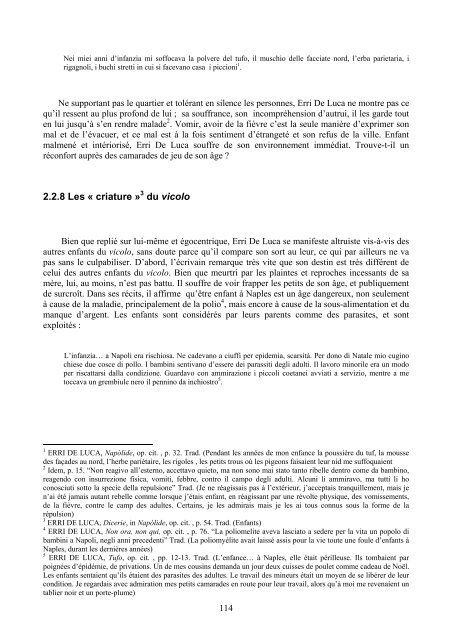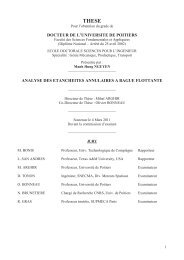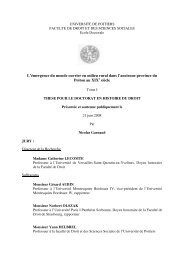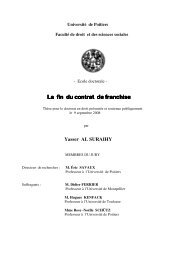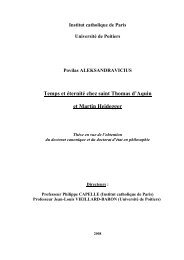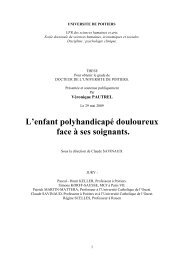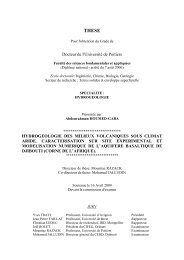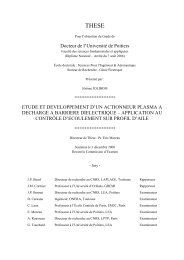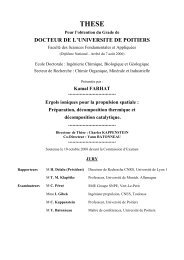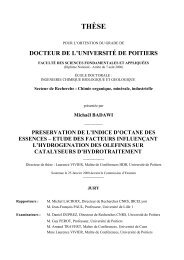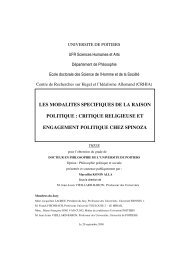Consulter le texte intégral de la thèse - Université de Poitiers
Consulter le texte intégral de la thèse - Université de Poitiers
Consulter le texte intégral de la thèse - Université de Poitiers
Create successful ePaper yourself
Turn your PDF publications into a flip-book with our unique Google optimized e-Paper software.
Nei miei anni d’infanzia mi soffocava <strong>la</strong> polvere <strong>de</strong>l tufo, il muschio <strong>de</strong>l<strong>le</strong> facciate nord, l’erba parietaria, i<br />
rigagnoli, i buchi stretti in cui si facevano casa i piccioni 1 .<br />
Ne supportant pas <strong>le</strong> quartier et tolérant en si<strong>le</strong>nce <strong>le</strong>s personnes, Erri De Luca ne montre pas ce<br />
qu’il ressent au plus profond <strong>de</strong> lui ; sa souffrance, son incompréhension d’autrui, il <strong>le</strong>s gar<strong>de</strong> tout<br />
en lui jusqu’à s’en rendre ma<strong>la</strong><strong>de</strong> 2 . Vomir, avoir <strong>de</strong> <strong>la</strong> fièvre c’est <strong>la</strong> seu<strong>le</strong> manière d’exprimer son<br />
mal et <strong>de</strong> l’évacuer, et ce mal est à <strong>la</strong> fois sentiment d’étrangeté et son refus <strong>de</strong> <strong>la</strong> vil<strong>le</strong>. Enfant<br />
malmené et intériorisé, Erri De Luca souffre <strong>de</strong> son environnement immédiat. Trouve-t-il un<br />
réconfort auprès <strong>de</strong>s camara<strong>de</strong>s <strong>de</strong> jeu <strong>de</strong> son âge ?<br />
2.2.8 Les « criature » 3 du vicolo<br />
Bien que replié sur lui-même et égocentrique, Erri De Luca se manifeste altruiste vis-à-vis <strong>de</strong>s<br />
autres enfants du vicolo, sans doute parce qu’il compare son sort au <strong>le</strong>ur, ce qui par ail<strong>le</strong>urs ne va<br />
pas sans <strong>le</strong> culpabiliser. D’abord, l’écrivain remarque très vite que son <strong>de</strong>stin est très différent <strong>de</strong><br />
celui <strong>de</strong>s autres enfants du vicolo. Bien que meurtri par <strong>le</strong>s p<strong>la</strong>intes et reproches incessants <strong>de</strong> sa<br />
mère, lui, au moins, n’est pas battu. Il souffre <strong>de</strong> voir frapper <strong>le</strong>s petits <strong>de</strong> son âge, et publiquement<br />
<strong>de</strong> surcroît. Dans ses récits, il affirme qu’être enfant à Nap<strong>le</strong>s est un âge dangereux, non seu<strong>le</strong>ment<br />
à cause <strong>de</strong> <strong>la</strong> ma<strong>la</strong>die, principa<strong>le</strong>ment <strong>de</strong> <strong>la</strong> polio 4 , mais encore à cause <strong>de</strong> <strong>la</strong> sous-alimentation et du<br />
manque d’argent. Les enfants sont considérés par <strong>le</strong>urs parents comme <strong>de</strong>s parasites, et sont<br />
exploités :<br />
L’infanzia… a Napoli era rischiosa. Ne ca<strong>de</strong>vano a ciuffi per epi<strong>de</strong>mia, scarsità. Per dono di Nata<strong>le</strong> mio cugino<br />
chiese due cosce di pollo. I bambini sentivano d’essere <strong>de</strong>i parassiti <strong>de</strong>gli adulti. Il <strong>la</strong>voro minori<strong>le</strong> era un modo<br />
per riscattarsi dal<strong>la</strong> condizione. Guardavo con ammirazione i piccoli coetanei avviati a servizio, mentre a me<br />
toccava un grembiu<strong>le</strong> nero il pennino da inchiostro 5 .<br />
1 ERRI DE LUCA, Napòli<strong>de</strong>, op. cit. , p. 32. Trad. (Pendant <strong>le</strong>s années <strong>de</strong> mon enfance <strong>la</strong> poussière du tuf, <strong>la</strong> mousse<br />
<strong>de</strong>s faça<strong>de</strong>s au nord, l’herbe pariétaire, <strong>le</strong>s rigo<strong>le</strong>s , <strong>le</strong>s petits trous où <strong>le</strong>s pigeons faisaient <strong>le</strong>ur nid me suffoquaient<br />
2 I<strong>de</strong>m, p. 15. “Non reagivo all’esterno, accettavo quieto, ma non sono mai stato tanto ribel<strong>le</strong> <strong>de</strong>ntro come da bambino,<br />
reagendo con insurrezione fisica, vomiti, febbre, contro il campo <strong>de</strong>gli adulti. Alcuni li ammiravo, ma tutti li ho<br />
conosciuti sotto <strong>la</strong> specie <strong>de</strong>l<strong>la</strong> repulsione” Trad. (Je ne réagissais pas à l’extérieur, j’acceptais tranquil<strong>le</strong>ment, mais je<br />
n’ai été jamais autant rebel<strong>le</strong> comme lorsque j’étais enfant, en réagissant par une révolte physique, <strong>de</strong>s vomissements,<br />
<strong>de</strong> <strong>la</strong> fièvre, contre <strong>le</strong> camp <strong>de</strong>s adultes. Certains, je <strong>le</strong>s admirais mais je <strong>le</strong>s ai tous connus sous <strong>la</strong> forme <strong>de</strong> <strong>la</strong><br />
répulsion)<br />
3 ERRI DE LUCA, Dicerie, in Napòli<strong>de</strong>, op. cit. , p. 54. Trad. (Enfants)<br />
4 ERRI DE LUCA, Non ora, non qui, op. cit. , p. 76. “La poliomelite aveva <strong>la</strong>sciato a se<strong>de</strong>re per <strong>la</strong> vita un popolo di<br />
bambini a Napoli, negli anni prece<strong>de</strong>nti” Trad. (La poliomyélite avait <strong>la</strong>issé assis pour <strong>la</strong> vie toute une fou<strong>le</strong> d’enfants à<br />
Nap<strong>le</strong>s, durant <strong>le</strong>s <strong>de</strong>rnières années)<br />
5 ERRI DE LUCA, Tufo, op. cit. , pp. 12-13. Trad. (L’enfance… à Nap<strong>le</strong>s, el<strong>le</strong> était péril<strong>le</strong>use. Ils tombaient par<br />
poignées d’épidémie, <strong>de</strong> privations. Un <strong>de</strong> mes cousins <strong>de</strong>manda un jour <strong>de</strong>ux cuisses <strong>de</strong> pou<strong>le</strong>t comme ca<strong>de</strong>au <strong>de</strong> Noël.<br />
Les enfants sentaient qu’ils étaient <strong>de</strong>s parasites <strong>de</strong>s adultes. Le travail <strong>de</strong>s mineurs était un moyen <strong>de</strong> se libérer <strong>de</strong> <strong>le</strong>ur<br />
condition. Je regardais avec admiration mes petits camara<strong>de</strong>s en route pour <strong>le</strong>ur travail, alors qu’à moi me revenaient un<br />
tablier noir et un porte-plume)<br />
114


